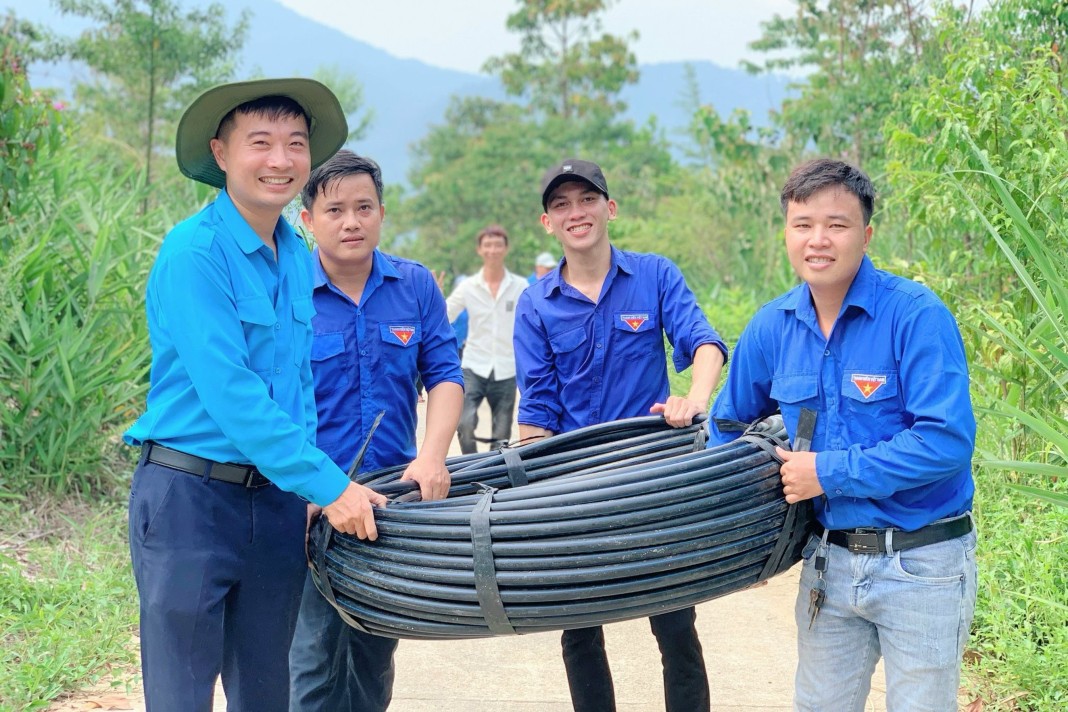Ong Ngoc is among the poorest mountainous villages of Tra Don Commune, Nam Tra My District, Quang Nam Province. The village with some 30 households has neither been electrified nor supplied with clean water.
The Communist Youth Union of the province’s Thang Binh District joined hands with the Communist Youth Union of the Trung Bo Mobile Police Regiment and Phan Duc, a voluntary group, to bring light and clean water to Ong Ngoc villagers.
On April 27 and 28, about 50 young members crossed forests, streams and steep slopes, bringing with them nearly 1,000 meters of water pipes, water tanks, and solar-powered lamps to Ong Ngoc Village. A team installed water pipes to convey upstream stream water to the village and a local school; another team installed water tanks and solar-powered lamps for the village and the school; and another one cut hair and cooked curry dishes for villagers and local students.
Ho Thi Thanh Thao, teacher of the village’s only school with 16 pupils from kindergarten to grade 1 and grade 2, told thanhnien.vn that she and her students are happy with the light and clean water supplied. Phan Duc, head of the voluntary group, who raised the fund to bring light and clean water to the village, said they were happy to contribute their small part to improving the life of the villagers and the students.
White-headed langurs embrace offspring on Cat Ba Island
Photos depicting a pair of white-headed langurs nurturing their newborn on Cat Ba Island surfaced on social media on May 6, quickly captivating numerous netizens.
Leaders of Cat Ba National Park said that this white-headed langur family welcomed 3-4 new members with golden fur in April. Given the extremely low population, the natural birth of these langurs signals a hopeful development for Cat Ba, according to the Tuoi Tre news site.
White-headed langurs, known as Cat Ba langurs and scientifically named Trachypithecus poliocephalus, are a critically endangered species. They are exclusively found on the Cat Ba Archipelago and are listed on the IUCN Red List of Threatened Species, facing the highest risk of extinction worldwide.
Night tours at Cuc Phuong National Park
Night tours to explore wildlife at Cuc Phuong National Park have been launched since May 4, providing unique and exciting experiences for visitors.
The tour is scheduled from 7 p.m. to 10 p.m. every day of the week, with each trip lasting about one to 1.5 hours. Visitors will travel by electric car along a route around five kilometers long, where they can observe fireflies and other animals up close, such as deer, insects, wildcats, and pangolins.
Pham Kien Cuong, director of the Center for Environmental Education and Services of Cuc Phuong National Park, told the VnExpress news site that this tour helps educate visitors about the environment and increases understanding of natural and wildlife.
To minimize disturbance to the natural habitats of flora and fauna, only a maximum of 100 visitors per trip are permitted. “Exploration is confined to the forest fringe area, and travelers are prohibited from entering the core zone,” he said.
First successful kidney transplant in Mekong Delta
More than 20 doctors at the Can Tho Central General Hospital successfully performed a kidney transplant on April 25, marking the first time such a surgery has been accomplished in the Mekong Delta region, reported the Dan Tri news site.
 The kidney recipient is a 34-year-old male patient, a teacher from Ben Tre Province, who has endured chronic kidney disease for six years. Two years ago, he was diagnosed with end-stage kidney disease at the Can Tho Central General Hospital. Earlier this year, he registered on the waiting list for a kidney transplant after the hospital met the Ministry of Health’s criteria for conducting such surgeries.
The kidney recipient is a 34-year-old male patient, a teacher from Ben Tre Province, who has endured chronic kidney disease for six years. Two years ago, he was diagnosed with end-stage kidney disease at the Can Tho Central General Hospital. Earlier this year, he registered on the waiting list for a kidney transplant after the hospital met the Ministry of Health’s criteria for conducting such surgeries.
The first kidney transplant in the Mekong Delta was performed by doctors from the Can Tho Central General Hospital with assistance from colleagues at Cho Ray Hospital in HCMC. Two weeks after the transplant, the patient’s health has stabilized, with kidney function almost back to normal.
“The success of the kidney transplant represents a milestone in the professional advancement of both the hospital and the region,” a representative of the hospital said.









